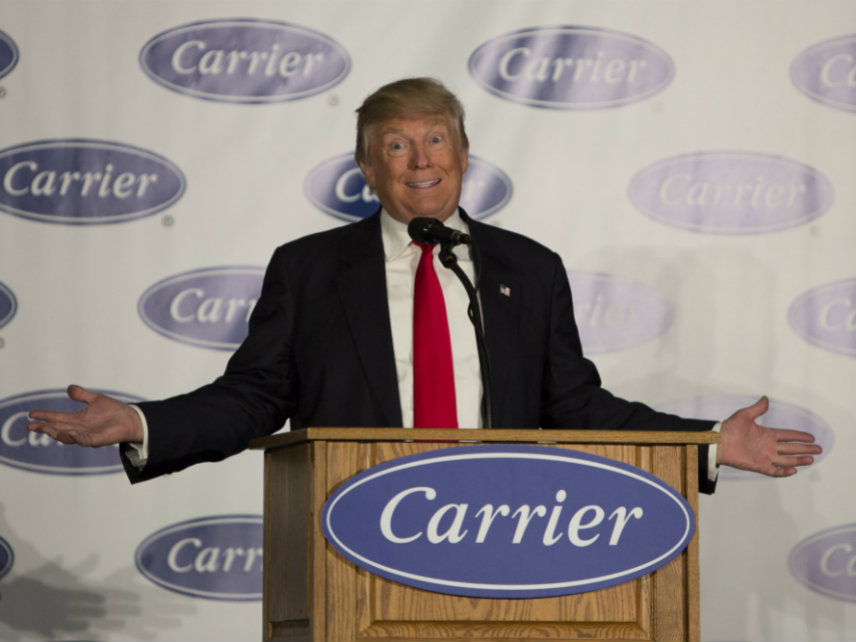Carrier Will Move Jobs to Mexico, Despite Trump's Promise to Keep Them in Indiana
They must be sick of winning already.

Cronyist-in-chief Donald Trump promised in December that he would do whatever was necessary to keep Carrier, an HVAC manufacturer, from laying off employees at an Indiana factory and shifting those jobs to Mexico.
On Thursday, Carrier announced it will lay off 600 workers in Indiana and shift those jobs to Mexico.
While the decision is understandably devastating for the people who will lose their jobs, it's heartening to know that the government's influence over the economy does not extend so far that the president can point his finger and tell CEOs how high to jump.
Before he had even been sworn into office, Trump promised about $7 million in economic incentives to Carrier in return for keeping about 1,100 jobs at the company's Indiana facility. Trump also announced that Carrier was making a $16 million investment in upgrades at its Indiana facility. Those upgrades, the president-elect promised, would result in more jobs in future years.
But as it stands today, "the jobs are still leaving," Robert James, president of United Steelworkers Local 1999, told CNBC. "Nothing has stopped." CNBC reported Thursday that Carrier would make the first round of cuts—338 jobs—in mid-July, and another 290 cuts in December.
The $16 million in upgrades Carrier had promised will be used to automate sections of the factory, likely resulting in a further reduction in the number of workers needed to run the plant.
Carrier has little reason to stay, as CNBC points out. The company generated more than $57 billion in revenue last year. The promise of paltry $7 million over 10 years to stay in an outdated facility with high labor costs was not much of an incentive.
David Henderson broke down the details of the Carrier deal in a cover story for Reason earlier this year:
The tax credit amounts to $700 per job per year. Is that enough, on its own, to keep Carrier from moving the jobs? It seems unlikely. Companies don't relocate factories on a whim; the firm would have expected significant and lasting gains from the move. In fact, according to a Washington Post story, Carrier had claimed that its move to Mexico would have saved $65 million per year. That's two orders of magnitude more than the new tax credit.
I'm not privy to Carrier's reasoning here, but it's safe to guess that one of three things happened. Either Trump has become so politically toxic that breaking a promise made to a president doesn't matter anymore (and might actually reflect favorably on Carrier in some quarters); or the company never really planned to keep those jobs here and merely used Trump's willingness to grandstand to score a bunch of free advertising (dutifully provided by the cable news networks that just can't get enough of our celebrity president).
Or, perhaps, Carrier is negotiating against Trump for an even better deal.
Regardless, the Carrier deal is further evidence that the government negotiating deals with individual companies is a foolish way to run an economy. The United States gained more than 138,000 jobs in May. In a country of 326 million people, jobs will come and go by the thousands on any given day. A president can't play whack-a-mole with every company looking for a better situation somewhere else.
Keep in mind Carrier CEO Robert McDonough said the decision to relocate had nothing to do with the business climate in Indiana, but that they were frustrated with the "rising red tape" in Washington D.C.
Rather than spending money to bribe companies to remain or relocate to certain places, governments should aim to reduce the cost of doing business for all employers. Lower regulatory burdens, better tax climates, and greater worker freedom will give both employers and employees the chance to succeed at home.
States and local governments spend more than $70 billion annually on various economic incentive programs, according to Good Jobs First, a union-backed nonprofit. That money could be better spent on infrastructure and schools, the nonprofit argues. Or, I would add, to reduce the overall tax burden to make states and localities more attractive to all businesses, not just the favored few.
If President Donald Trump, the most powerful elected official in the world and the self-described maker of great deals, can't use his influence to stop businesses from relocating to other countries, maybe it's time to try a different tactic.


Show Comments (16)